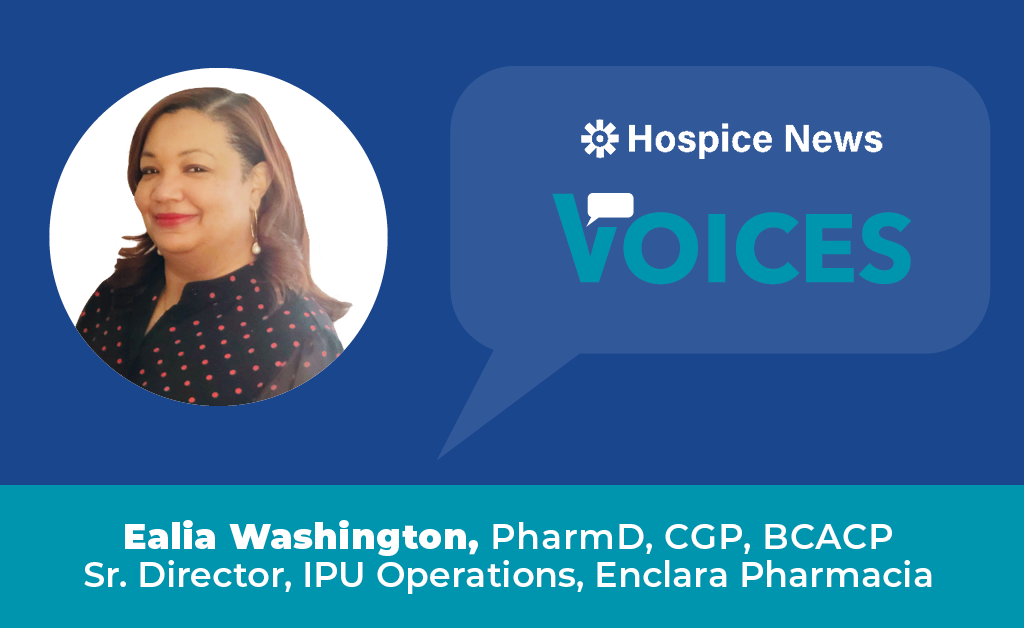This article is sponsored by Enclara. In this Voices interview, Hospice News sits down with Ealia Washington, Sr. Director of IPU Operations at Enclara Pharmacia, to learn the ins and outs of the inpatient unit hospice, or IPU. Washington shares her experiences leading Enclara’s round-the-clock IPU support team and notes how Enclara is helping IPU nurses provide the best possible end-of-life care.
Hospice News: What experiences in your background you most draw from in your role today?
Ealia Washington: Throughout my career, I’ve worked in a variety of settings, including retail, hospital, academia, as well as clinical. These settings have afforded me the opportunity to not only collaborate with my fellow pharmacists, but with other members of the health care team, including patients and caregivers. I am able to view and understand the role and goals of the hospice inpatient level of care from various perspectives, which ultimately allows me to strategize and advocate both internally and externally, while prioritizing end-of-life patient outcomes.
Tell us about the inpatient unit hospice, known as IPU. What purpose does the IPU serve within the hospice ecosystem?
Washington: Patients are admitted to an IPU, or inpatient unit, when they exhibit symptoms that might no longer be controlled at home. It is also common for hospice providers to support various levels of care for IPU, such as a brief respite stay, typically five days in length. During this time, the patient’s caregiver can rest and recuperate.
The overall goal is to provide patients with comfort and support at the end of life. Patients and their families generally prefer to be in the comfort of their own home. IPUs provide higher-level care, but in a home-like setting. This typically includes private patient rooms and bathrooms and spaces outside the room for families to gather, relax, eat and speak with the providers.
Enclara has a 24/7 IPU support team. What are the most common after-hour challenges that IPU providers face, and how does Enclara help resolve those challenges?
Washington: The most common challenge our hospice partners encounter after-hours is access to medications for patients who are newly admitted or experiencing an acute symptom exacerbation, such as pain agitation, nausea or vomiting. Our palliative-trained IPU pharmacists are available to support and address these needs by providing clinical consultation, locating and coordinating the delivery of medication, or leveraging the technology that allows for immediate access to medication stored in an automated dispensing system located in the hospice unit.
How does Enclara’s IPU support help hospice providers allocate its financial resources?
Washington: We support our hospice partners’ efforts to minimize costs in a general inpatient setting by collaborating with leadership and clinical support teams on utilization review. Part of the utilization review includes discussing drug shortages, non-formulary use, ancillary costs, deprescribing strategies and other cost-containment opportunities. It also includes reporting on and managing utilization of certain drug classes for compliance purposes.
Our automated dispensing program presents a lot of opportunities to manage drug costs. We provide remote management of both Pyxis and Omnicell machines that store commonly used medications and dispense them to patients. That reduces medication waste on a per-patient basis. These systems also reduce costs associated with after-hours and urgent medication delivery since a medication can be prescribed through Enclara and released from the unit in minutes.
How does Enclara support IPU nurses, specifically?
Washington: We have an IPU-dedicated team available 24/7, 365 days of the year, to support IPU nurses. The team includes pharmacists, technicians and dedicated technical resources to help clinicians provide timely and appropriate symptom management to their patients. This is where our dedicated IPU clinicians come into play, to provide clinical consultations by evaluating and recommending medications and alternative routes of administration.
Additionally, we support various dispensing models to help overcome medication management challenges in the inpatient setting. These models range from automated dispensing to utilization of an emergency kit, known as an e-kit, which allows immediate access to emergency medications while also supporting routine medication needs.
What is new from Enclara this year that will help hospice providers?
Washington: We’re excited to integrate our new E3 Pro web and mobile medication management application into our IPU model, which will ultimately expedite order processing and medication availability at the time of patient admission or transfer into the inpatient unit. All things technology-related — that’s what we’re excited about.
Finish this sentence: “The hospice industry in 2022 will be the year of…”
Washington: Innovation.
Editor’s note: This interview has been edited for length and clarity.
Enclara Pharmacia offers support and convenience to hospice care providers and patients through the most comprehensive service and technology solutions in hospice. To learn more, visit enclarapharmacia.com.
The Voices Series is a sponsored content program featuring leading executives discussing trends, topics and more shaping their industry in a question-and-answer format. For more information on Voices, please contact [email protected].


